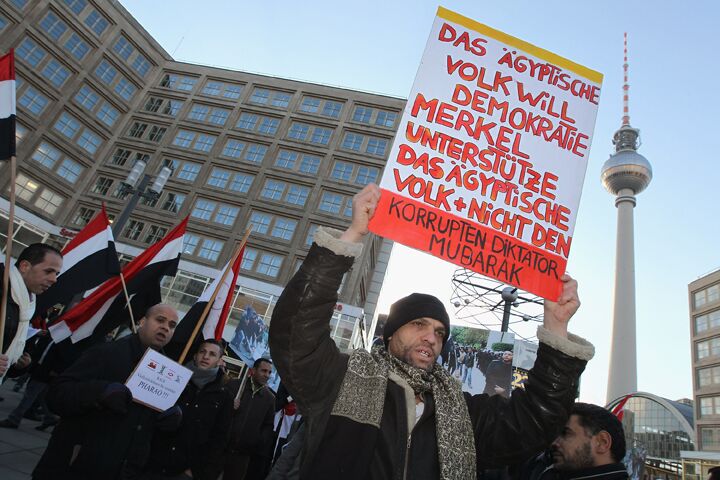
German Fingers in Egyptian Pie
During the ongoing upheavals in Egypt, little publicity has been given to German strategic interests in that nation, or indeed in the surrounding region of North Africa and the Mediterranean.
Germany’s postwar involvement with Egypt dates to the establishment of diplomatic relations in 1957. German interests in Egypt are driven by its strategic location at the vital Suez gateway via which many of its products are shipped south to southern and eastern markets, China in particular.
Egypt and Germany have well-established cultural exchanges established via the Cultural Cooperation Protocol signed in 1959 in addition to two other agreements signed in 1979 and 1981 covering cultural and scientific cooperation.
Politically the two nations enjoy exchanges of information in areas of mutual interest through the bilateral framework of what is known as the Euro-Med Cooperation agreements.
During a visit to Berlin in April 2008, Egyptian President Hosni Mubarak established a joint committee of representatives of both countries to explore areas of mutual interest in which they could jointly cooperate each to the other’s benefit. These areas of interest include political dialogue, trade and industry, environment, scientific research, culture, and judicial and immigration matters. Inevitably, the German security and intelligence service, the bnd, will use these fronts to mask its spy activities in a foreign country. Thus it is that German intelligence is kept up to date with the machinations of competing movements in Egypt as it currently undergoes the process of regime change.
Germany has shown particular interest in helping to secure the Gaza Strip, the vital corridor buffering Israel at its southern border with Egypt. At the summit conference held in Sharm el-Sheikh in March 2009 to discuss the reconstruction and security of Gaza, Germany’s Chancellor Angela Merkel took a lead role.
Germany and Egypt are in agreement on the two-state solution to the Palestinian question, a main sticking point with the Middle East peace process in which Germany is busy working behind the scenes in an effort to take on a lead role.
Key to understanding German foreign policy in Egypt is the increasing extent of its involvement in industry, and the Bundeswehr elites’ involvement with Egypt’s military elites.
German-Foreign-Policy.com has reported that “Following Egyptian President Hosni Mubarak’s announcement that he would not seek reelection in the upcoming presidential elections in September, the German government has reinforced its efforts to gain influence in Cairo’s incoming power structures. The Egyptian military still has control. The most important ministers are from the military” (February 3).
Noting this, German-Foreign-Policy.com continues, “A constellation that could successfully leave Egyptian power with [Omar] Suleiman and the military would be favorable to the Western powers. This would permit the maintenance of the existing precarious Middle East tensions, based on support for Israel by some of the Arab governments—including the Egyptian—and permitting Western control over Arab resources.”
But Berlin is hedging its bets in Egypt by also continuing to court opposition groups through its traditional method of masking its strategic political intentions behind educational and humanitarian initiatives.
“In case the military cannot stabilize its control over the Egyptian situation, Berlin is maintaining contact with members of the opposition, also through German-party-affiliated foundations, such as the Friedrich Naumann Foundation” (ibid.). That foundation is directly affiliated with Chancellor Merkel’s main coalition partner, the Federal Democratic Party.
Then there is the rather intriguing connection between the Muslim Brotherhood (MB) and Germany.
“Postwar West Germany offered the MB a valuable safe haven in the heart of Europe, primarily because the Ikhwan [Muslim term for the Muslim Brotherhood] had established a relationship with the Nazis during World War ii and maintained ties to powerful Germans after the war” (Center for Security Policy, Oct. 7, 2010).
Over the past 20 years, we have often publicized in the Trumpet magazine the historically documented fact that many former Nazis were placed into positions of influence under Germany’s first postwar government headed by Chancellor Adenauer.
During Adenauer’s chancellorship, “The West Germans were especially welcoming of Syrians and Egyptians because of a state policy that offered assistance to any ‘refugees’ from nations that formally recognized Bonn’s rival, Communist East Germany—something both Egypt and Syria did” (ibid.). So it was that, mid-20th century, the Muslim Brotherhood found safe haven in Germany.
Thus it is that today Germany is involved with, and has influence over, the three main parties that could have impact on shaping the post-Mubarak future of the highly strategic nation of Egypt: the military elites, the opposition parties and the Muslim Brotherhood.
But one of the main thrusts of Germany’s involvement with the Egyptian elites has been to counter initiatives by France in its efforts to supply a counterweight to Germany’s lucrative interests in Eastern Europe by President Nicolas Sarkozy’s Mediterranean Union.
President Sarkozy’s main partners in this political/economic union were President Hosni Mubarak of Egypt and President Zine El Abidine Ben Ali of Tunisia. The deposing of the Tunisian president and the apparent downfall of Hosni Mubarak has led to the collapse of the French-inspired Mediterranean Union. Its general secretary, seeing the writing on the wall, recently resigned. This is a significant defeat for France’s efforts to influence events in the Middle East and Mediterranean region against specific German economic and political interests. The door is now open for Germany to move in and become the main agent of influence in this crucially strategic region.
Watch Northern Africa closely now for the power behind the thrones in the southern rim of the Mediterranean to increasingly emanate from Europe’s richest economy and most powerful political force, Germany!
Germany will be seeking to secure its hold over the Mediterranean Sea and the crucial gateways at its western and eastern extremities—Gibraltar and Suez.
Read our booklets History and Prophecy of the Middle East, Nahum: An End-Time Prophecy for Germany and The King of the South for a full overview of just what is building in Northern Africa and the Middle East today, and its eventual surprising outcome.
